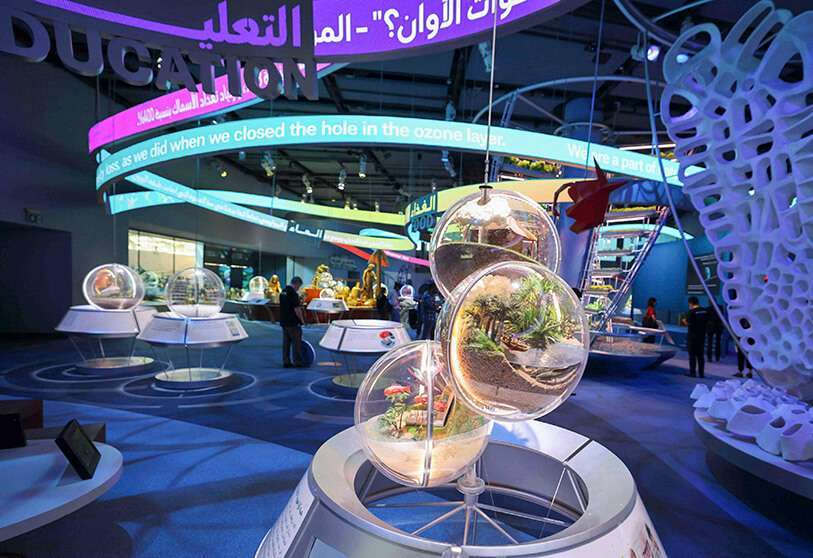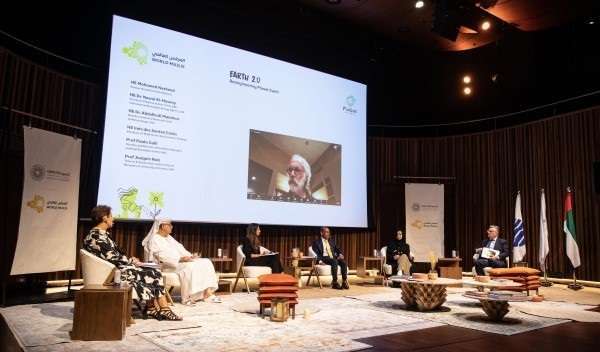Expo Dubai 2020 shows importance of collaboration and learning from nature

'The World Majlis, Earth 2.0/Reengineering Planet Earth', presented in collaboration with the Maldives as part of Climate and Biodiversity Week at Expo Dubai 2020, has highlighted the strong sense of urgency to achieve global sustainability goals. Panelists shared insights on the importance of innovation and collaboration to deliver solutions that support these goals. The discussion sought to address the role of technology and engineering in a warming world, the risks associated with such efforts and how to balance the interests of different stakeholders in an equitable manner.
Mohammed Nasheed, former president of the Maldives and chairman of the People's Majlis, spoke of the importance of this initiative: "One of the most important things is not to lose hope. There is a bit of pessimism ... we seem to feel that it is out of control, but if we follow the pessimistic picture, it will be difficult for us to find solutions. I believe in human ingenuity, and I believe we have solutions. The idea is to see if we can use nature as infrastructure. The reef protects our coasts for a start, it reduces wave energy and therefore stops coastal erosion. Its biodiversity contains our livelihoods [with fishing] and the people who come to see it are also part of our livelihoods, and it's all threatened by global warming. The argument is to see how we can help nature to grow faster".
"Because of erosion, we have to build breakwaters and embankments to protect our coastline... but it costs $5,000 to protect one metre of coastline, so it's just not feasible. Meanwhile, it costs $20 a metre to grow a reef ... It takes longer, and that's why we need to get the science involved more quickly. It's very important that we find these solutions now ... about how we can make coral grow faster and how we can restore it. If we focus on the good news, we will be in a much better place than if we focus on the pessimistic stories," said Mohammed Nasheed.

During the forum, Abdullah al-Mandous, director general of the UAE National Meteorological Centre, spoke about the UAE's pioneering role in cloud seeding, an excellent example of technology that works for the benefit of the environment. "The United Arab Emirates has a harsh climate and high evaporation ... With weather modification, you can re-engineer any of the weather elements ... We do it to improve rainfall," Abdullah al-Mandous said.
For her part, Dr Nawal al-Hosany, the UAE's permanent representative to the International Renewable Energy Agency (IRENA), discussing the growth of the rain enhancement programme, added that it is important "to be able to advance such specialised research and expand its use", and that "doing this is so attractive to so many universities ... it's incredible".
Explaining that the UAE is not an oil exporter, but an energy exporter, Nawal al-Hosany said: "Our leadership has just announced a strategic initiative towards net zero ... based on clear milestones and initiatives that aim to take us to that goal, which is part of our global responsibility, while providing opportunities for economic growth and job opportunities. These came out of a government accelerator, looking at what it means to be net zero."
"The UAE had a strong and leading position in oil and gas, and we want to maintain that in renewables as well ... and we have contributed to this around the world. When His Highness Sheikh Mohammed bin Zayed said we will celebrate when we send our last barrel of oil ... it is because we will be ready ... we are a responsible nation and our responsibility is to provide energy to the world," Al-Hosany said.

Meanwhile, Inês dos Santos Costa, Portugal's Secretary of State for the Environment, welcomed the proposal: "If we think of technology as the hardware of the system we want to design, it won't be enough... with the 'software' [we have]. We need to start changing our discourse... First of all, we need to recognise that the supply and demand curve does not occur in a vacuum..... If economics does not respect those boundaries, it will fail. Second, we need to find a different meaning for the word growth. We want it to be in health, in welfare, in regeneration, in education... we need to change the way we look at economic development with new objectives, and that must be present when we think about new technologies. And finally, to meet our commitments... the IPCC states that we won't get there until we review the way we extract, produce and consume. We see technology as a saviour ... without changing the status quo".
Professor Joaquín Ruiz, vice president of Global Environmental Futures, and Thomas R. Brown, president and director of Biosphere 2 and professor of geosciences at the University of Arizona in the United States, highlighted the work to be done: "We have designed a world without thinking about the consequences of how we have designed it.... we all need to remember the difference between science and engineering ... we must talk deeply with other disciplines, because many of the engineering solutions we come up with have enormous ethical and political consequences".
Professor Ruiz also presented the successful concept of growing food under solar panels - "harvesting the sun twice" - which has been found to provide energy security, water security and food security. He explained that doing so creates microclimates and potentially allows for up to three growing seasons per year (instead of two). The electricity generated can be used to clean or pump water, and the shade from the solar panels means that moisture stays in the soil for longer, meaning less water is needed.
Professor Paolo Gali, founder and director of the Centre for Marine Research and Higher Education (MaRHE) and senior lecturer in Ecology, Department of Environmental Sciences, University of Milano-Bicocca, Italy, said: "We need to talk to different people ... merge different skills. Biologists have to talk to doctors, veterinarians, engineers... and sometimes you have to think in a crossword puzzle way: horizontally, vertically and in depth. We have to share and think in an "open source" way. As a researcher, we have to give the best data and the best solutions to policy makers. We have to give them the opportunity to do the best they can, by providing them with the best data. If we do that, we can do the best thing for humanity: act very fast.
Text, images and videos: Dubai Expo 2020.










